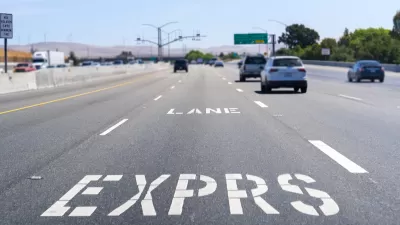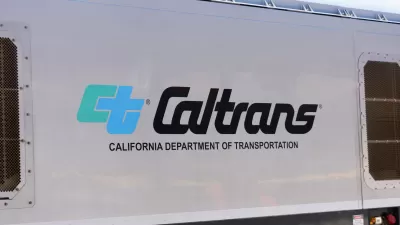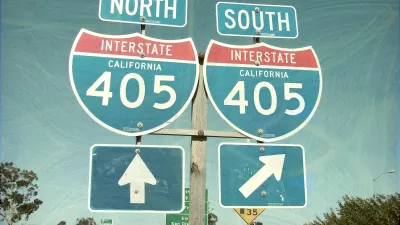With New York City's congestion pricing proposal effectively dead, DOT Secretary Peters indicated that the city had forfeited its $350 million grant, and gave other cities the chance to apply. Now Los Angles may grab over $200 million for transit.
The Los Angeles County Metropolitan Transportation Authority (MTA) unanimously voted April 24 to proceed with plans to convert High Occupancy Vehicle (HOV) lanes on the 10 and 210 freeways to High Occupancy Toll (HOT) lanes and apply congestion pricing so that the toll during commute hours would be high enough to keep traffic flowing at 45 mph in those lanes. The adjacent 'mixed-use' lanes would remain unpriced and unmanaged.
"In a nationwide competition for the money last year, Los Angeles County was eliminated in the first round after it committed only to study congestion pricing because tolls were controversial in a state that takes pride in having "freeways."
So local officials reapplied in December and struck gold after New York Mayor Michael Bloomberg's congestion pricing plan was sunk by the New York state Legislature. [See related link]. That freed up money for Los Angeles County, which federal officials have described as one of the nation's preeminent laboratories for traffic.
U.S. Department of Transportation Secretary Mary Peters will hold a news conference in Los Angeles (on April 25) to announce the deal, first reported in The Times April 24. [See related link].
"Events moved quickly this week after the MTA learned that the U.S. Department of Transportation was prepared to offer local transit officials more than $200 million to buy about 60 high-capacity buses and upgrade Metrolink train service in the San Gabriel Valley. In exchange, the MTA board had to agree to try on its freeways some so-called congestion pricing, a toll scheme in which the charge varies by time of day."
Thanks to MTC-ABAG Library
FULL STORY: MTA votes for tolls on some carpool lanes by 2010

Maui's Vacation Rental Debate Turns Ugly
Verbal attacks, misinformation campaigns and fistfights plague a high-stakes debate to convert thousands of vacation rentals into long-term housing.

Planetizen Federal Action Tracker
A weekly monitor of how Trump’s orders and actions are impacting planners and planning in America.

In Urban Planning, AI Prompting Could be the New Design Thinking
Creativity has long been key to great urban design. What if we see AI as our new creative partner?

Baker Creek Pavilion: Blending Nature and Architecture in Knoxville
Knoxville’s urban wilderness planning initiative unveils the "Baker Creek Pavilion" to increase the city's access to green spaces.

Pedestrian Deaths Drop, Remain Twice as High as in 2009
Fatalities declined by 4 percent in 2024, but the U.S. is still nowhere close to ‘Vision Zero.’

King County Supportive Housing Program Offers Hope for Unhoused Residents
The county is taking a ‘Housing First’ approach that prioritizes getting people into housing, then offering wraparound supportive services.
Urban Design for Planners 1: Software Tools
This six-course series explores essential urban design concepts using open source software and equips planners with the tools they need to participate fully in the urban design process.
Planning for Universal Design
Learn the tools for implementing Universal Design in planning regulations.
planning NEXT
Appalachian Highlands Housing Partners
Mpact (founded as Rail~Volution)
City of Camden Redevelopment Agency
City of Astoria
City of Portland
City of Laramie





























